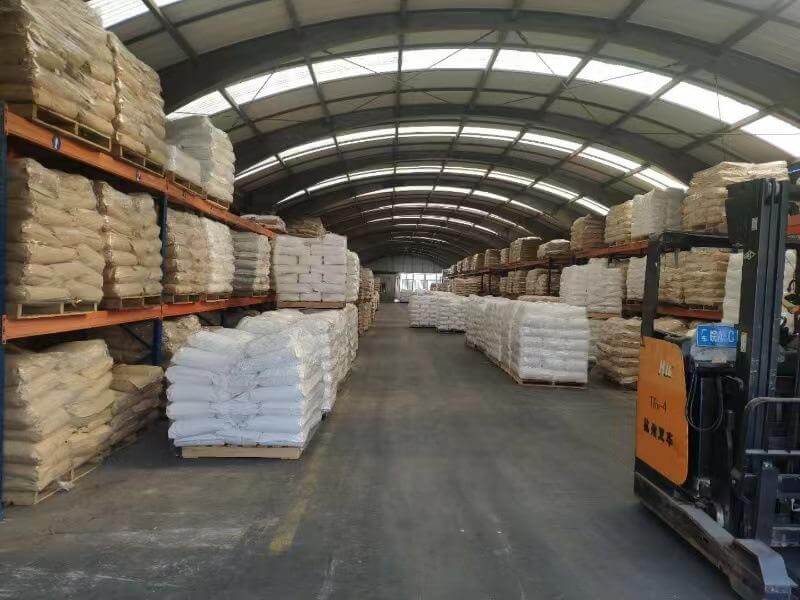Fabricant de HPMC-hydroxypropylméthylcellulose
Votre fournisseur chinois de confiance pour l'hydroxypropylméthylcellulose (HPMC)
HPMC de haute qualité adapté aux applications de construction, pharmaceutiques et industrielles. En tant que fournisseur fiable basé en usine, Morton offre des performances constantes, des prix compétitifs et une expertise mondiale.
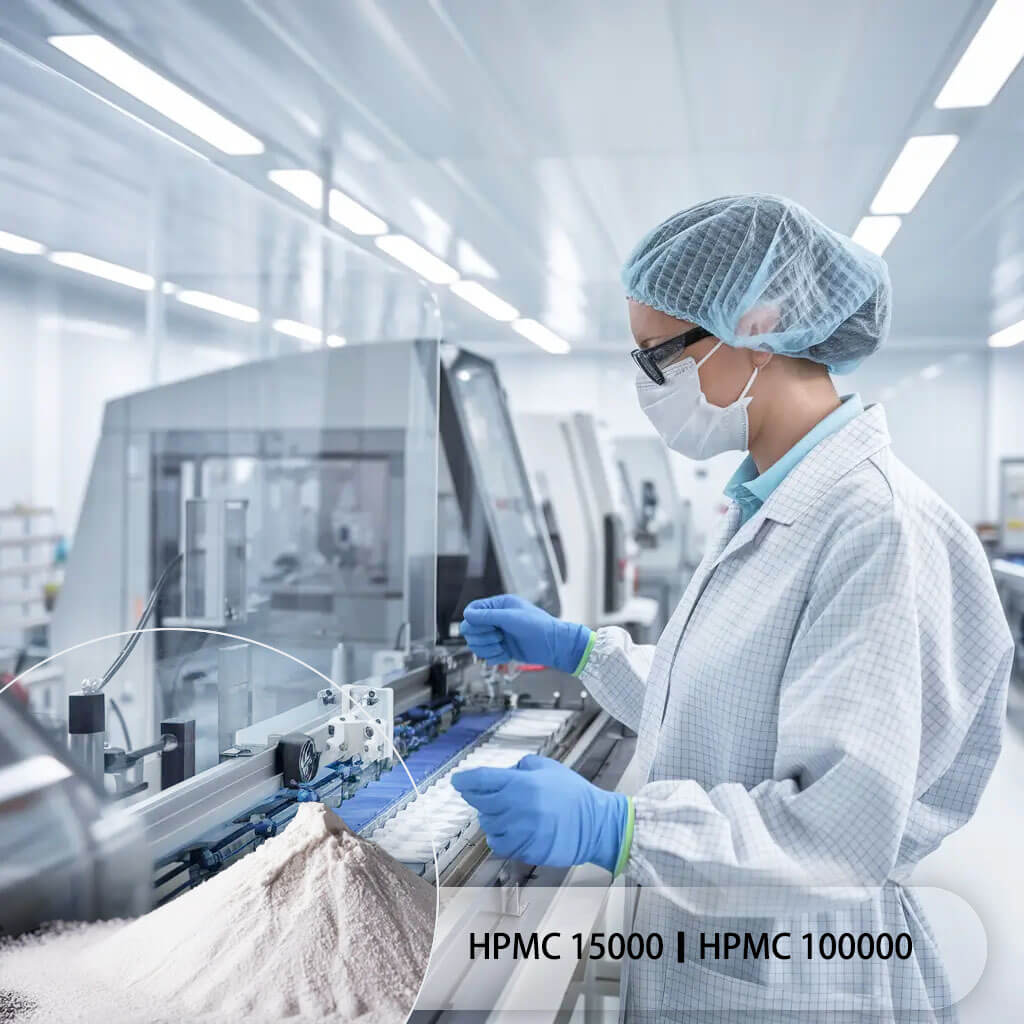
HPMC pharmaceutique
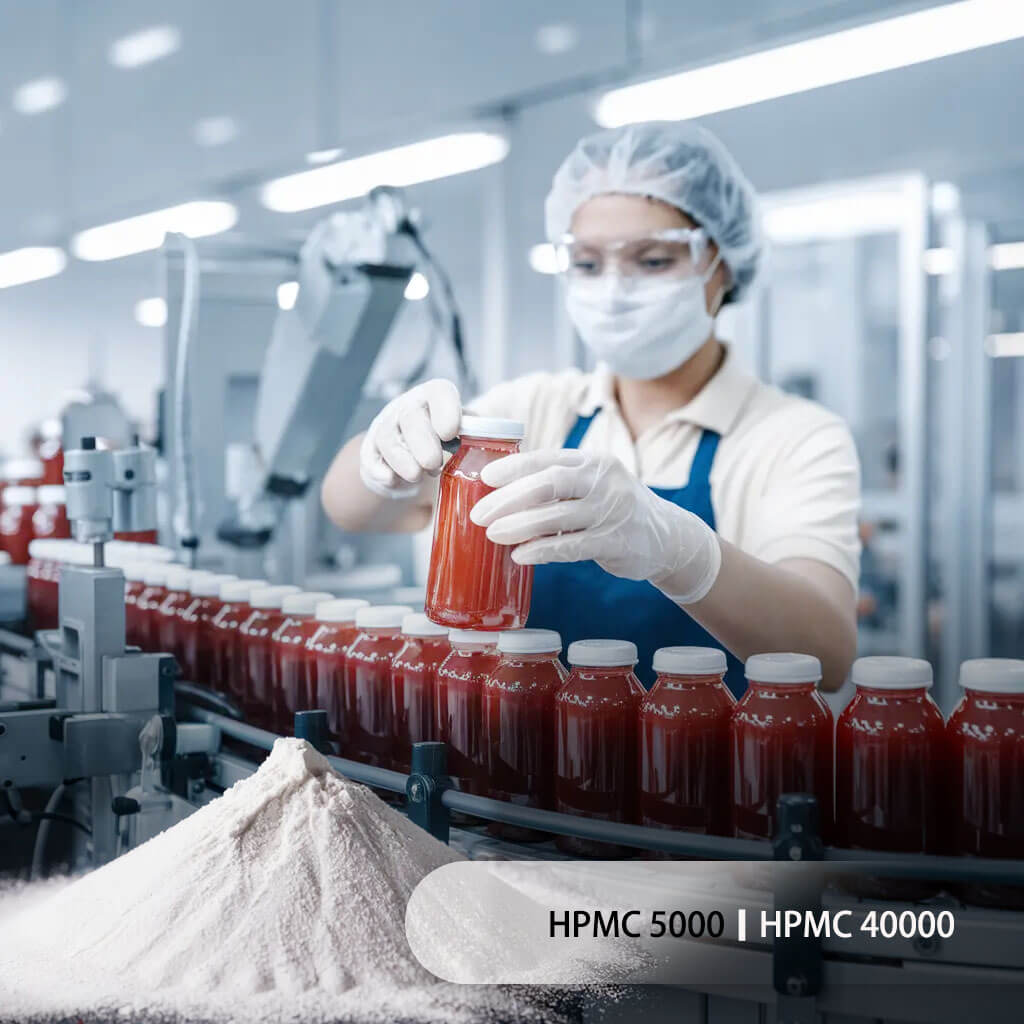
HPMC de qualité alimentaire
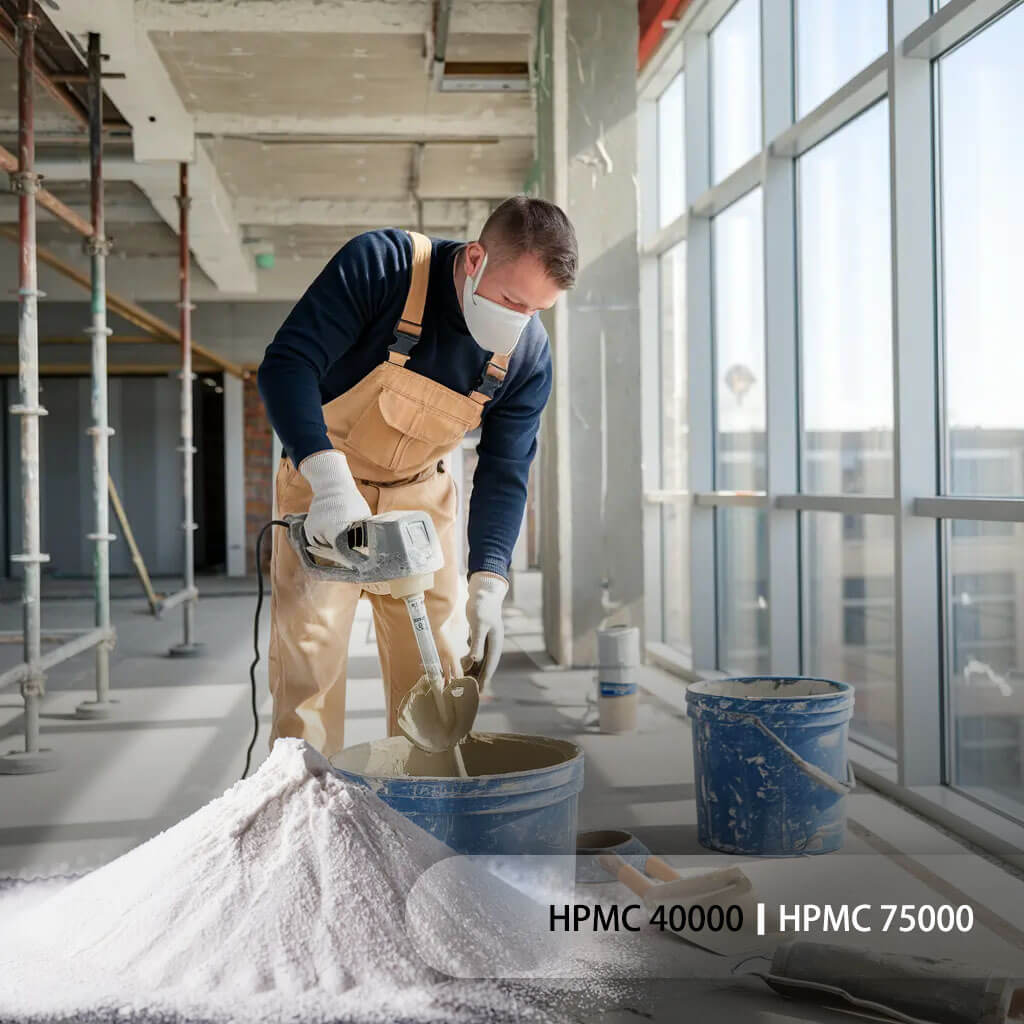
Construction HPMC
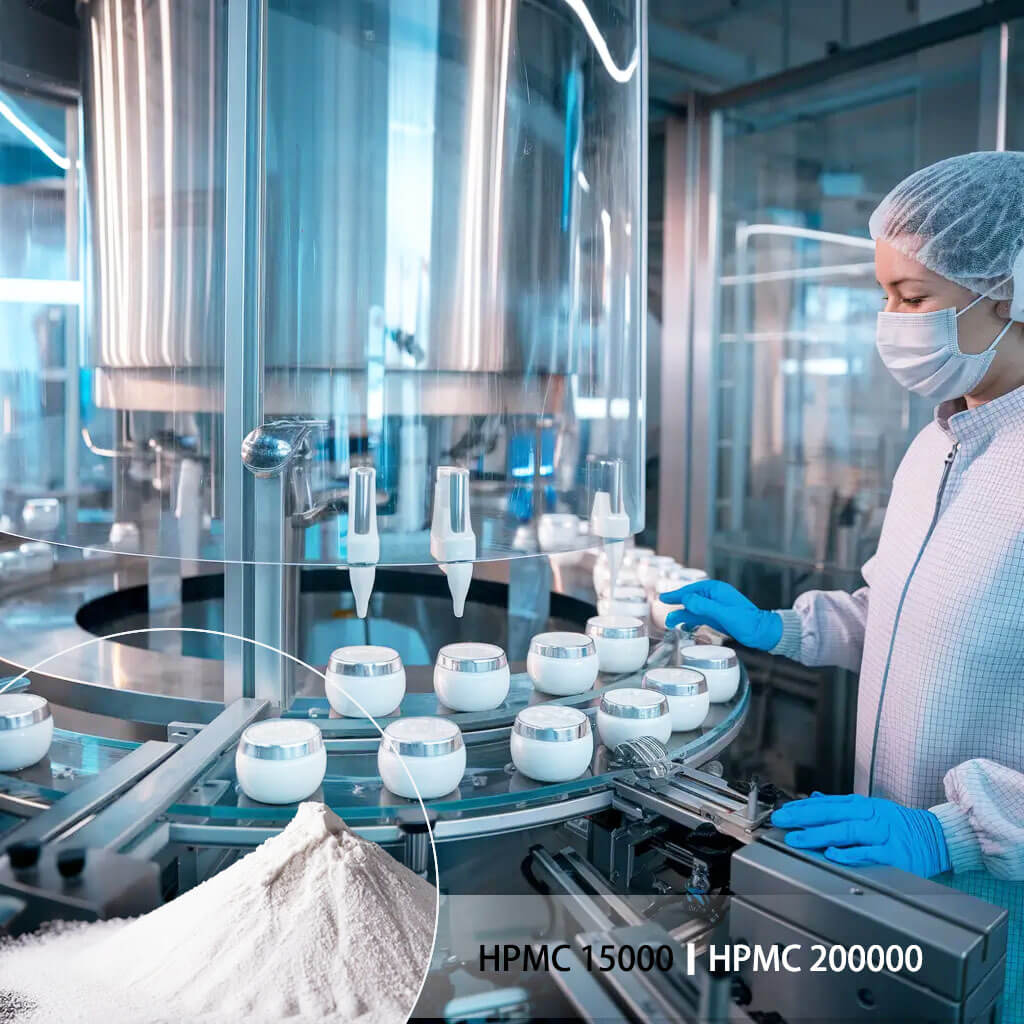
HPMC de qualité cosmétique
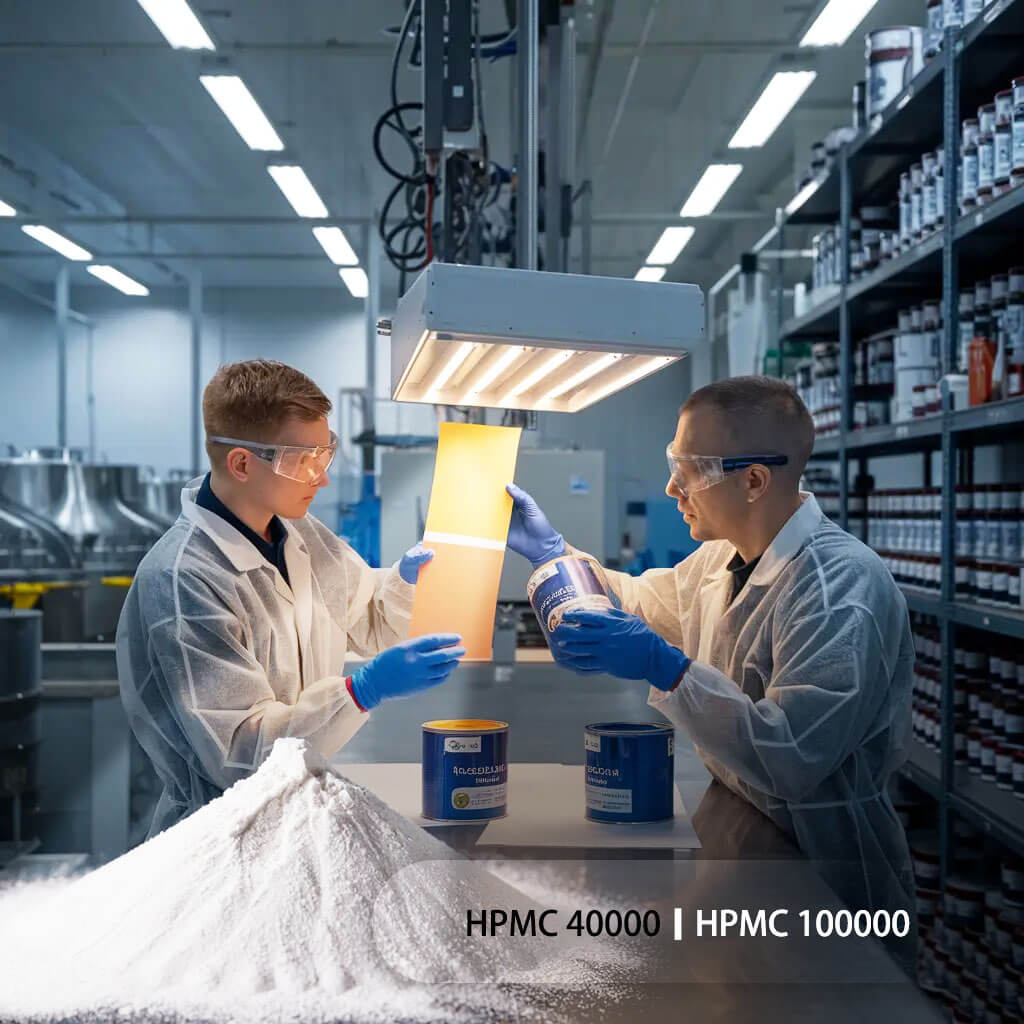
HPMC de qualité industrielle et de revêtement
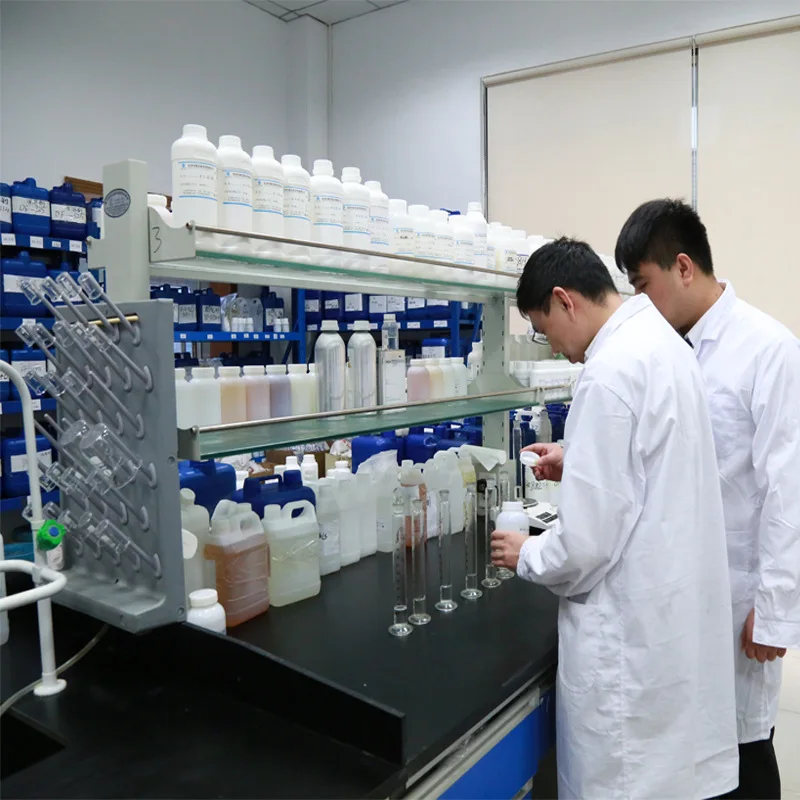
Personnaliser HPMC
Obtenez un devis HPMC personnalisé adapté à votre secteur d'activité
Tout ce que vous devez savoir sur l'hydroxypropylméthylcellulose (HPMC)
L'hydroxypropylméthylcellulose (HPMC) est un éther de cellulose polyvalent dérivé de matières premières naturelles. Connu pour ses propriétés exceptionnelles de rétention d'eau, d'épaississement et de formation de film, l'HPMC joue un rôle essentiel dans l'amélioration des performances dans divers secteurs, notamment la construction, les produits pharmaceutiques et les soins personnels.
Qu'il s'agisse d'assurer une application homogène dans les mortiers secs ou de stabiliser les formulations dans les produits alimentaires et pharmaceutiques, l'HPMC transforme les industries modernes. Son adaptabilité à diverses applications et sa stricte conformité aux normes mondiales en font un ingrédient essentiel pour des solutions fiables et performantes.
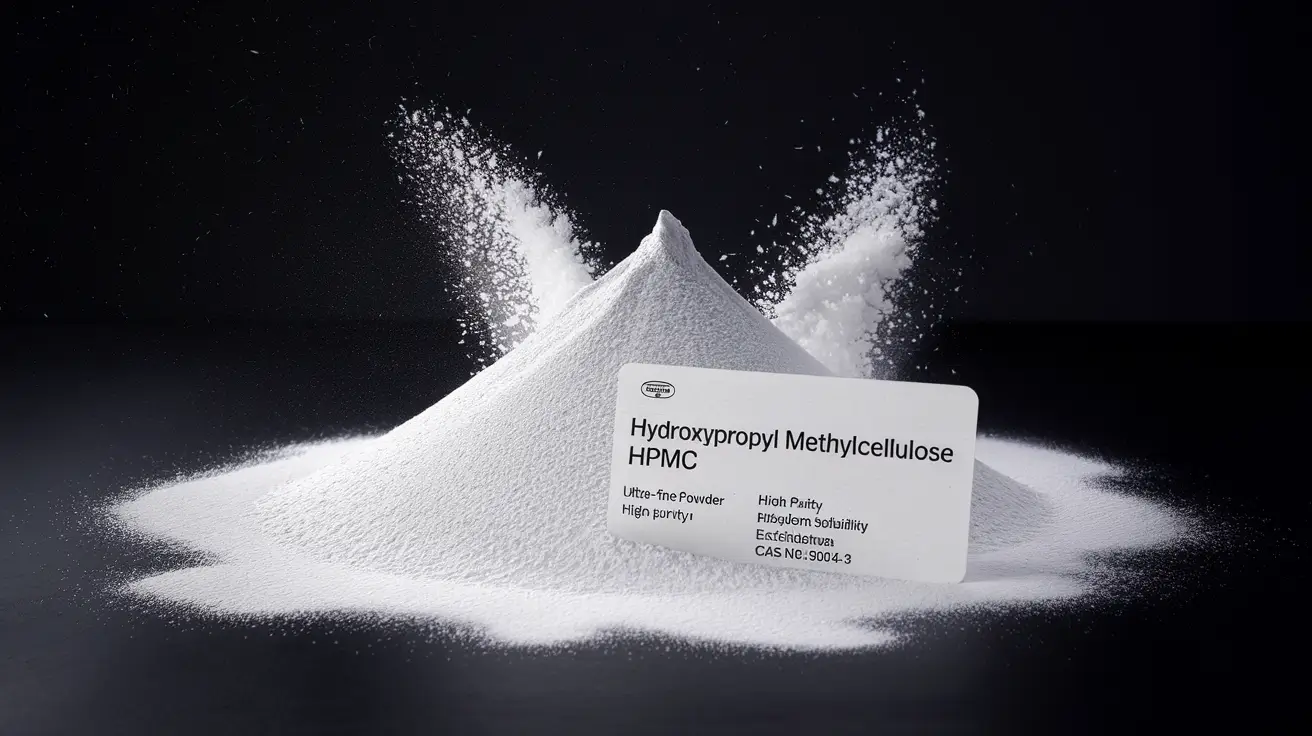
Avantages de l'hydroxypropylméthylcellulose (HPMC)
Propriétés de gélification thermique améliorées
Notre HPMC offre une gélification thermique supérieure, garantissant stabilité et libération contrôlée même dans les applications à haute température.
Distribution granulométrique ultra-fine
Atteignant une consistance supérieure à 95% dans la plage de 75 à 150 microns, notre HPMC assure une dissolution plus rapide et une dispersion uniforme dans les formulations.
Faible teneur en métaux lourds
Avec moins de 10 ppm de métaux lourds, notre HPMC répond aux normes pharmaceutiques et alimentaires strictes en matière de pureté.
Degré de substitution personnalisable
Les niveaux de substitution méthoxyle (19-30%) et hydroxypropyle (4-12%) sur mesure offrent des performances optimisées en termes de viscosité, de rétention d'eau et de formation de film.
Rétention d'eau exceptionnelle
Assure une maniabilité améliorée et des temps d'ouverture prolongés pour les matériaux de construction et de bâtiment, augmentant ainsi l'efficacité globale.
Écologique et durable
Dérivé de sources de cellulose renouvelables, notre HPMC s'aligne sur des objectifs de production et de durabilité respectueux de l'environnement.
Applications polyvalentes dans de nombreux secteurs
- Utilisations pharmaceutiques

HPMC comme excipient pharmaceutique
Dans le monde pharmaceutique, l'HPMC est un excipient polyvalent qui garantit la stabilité et l'efficacité des médicaments. Sa nature non toxique et biocompatible en fait un choix privilégié pour améliorer les formulations de médicaments.
Formulations à libération contrôlée et liants pour comprimés
La capacité de l'HPMC à contrôler les taux de libération des médicaments et à lier les ingrédients des comprimés contribue largement à son utilisation dans les systèmes modernes d'administration de médicaments. Son rôle garantit la précision et la cohérence des performances des médicaments.
Rôle dans le pelliculage et les solutions ophtalmiques
L'HPMC est essentiel pour créer des films protecteurs pour les comprimés, améliorant leur durée de conservation et leur facilité d'ingestion. De plus, il est utilisé dans les solutions ophtalmiques pour améliorer la viscosité et assurer le confort des produits de soins oculaires.
Agent épaississant et émulsifiant dans les produits alimentaires
L'HPMC agit comme un agent épaississant et émulsifiant fiable dans les aliments, améliorant la texture, la stabilité et l'apparence des produits allant des sauces aux produits de boulangerie.
Solutions sans gluten et fibres alimentaires
En tant qu'alternative au gluten, l'HPMC joue un rôle essentiel dans la création de structures élastiques et stables dans le pain et les pâtisseries sans gluten. Il apporte également des fibres alimentaires, rendant les aliments plus sains sans compromettre la qualité.
- Applications dans l'industrie alimentaire

- Construction et matériaux de construction
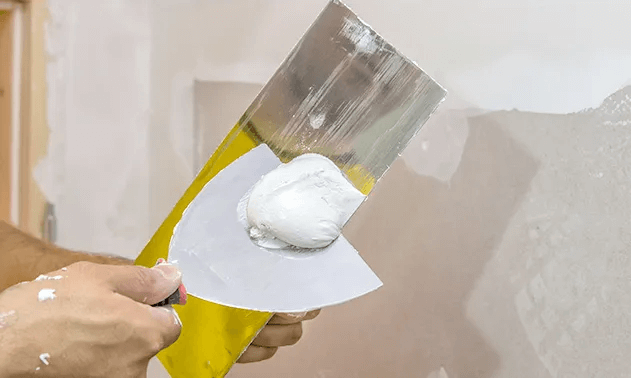
Additifs pour ciment et mortier pour la résistance et la durabilité
Dans la construction, le HPMC améliore la maniabilité, la résistance et la durabilité du ciment et du mortier, garantissant des matériaux durables et efficaces.
Colles pour carrelage et rétention d'eau dans la construction
L'HPMC améliore la rétention d'eau dans les adhésifs pour carrelage, permettant des liaisons plus solides et une meilleure application, même dans des conditions environnementales difficiles.
Agents filmogènes dans les soins de la peau et des cheveux
L'HPMC forme une couche protectrice flexible sur la peau et les cheveux, apportant hydratation et améliorant les performances des produits de beauté.
Stabilisants dans les détergents et les nettoyants
Ses propriétés stabilisantes dans les détergents et les nettoyants ménagers empêchent la séparation, assurant une application uniforme et un pouvoir nettoyant optimal.
- Cosmétiques et soins personnels
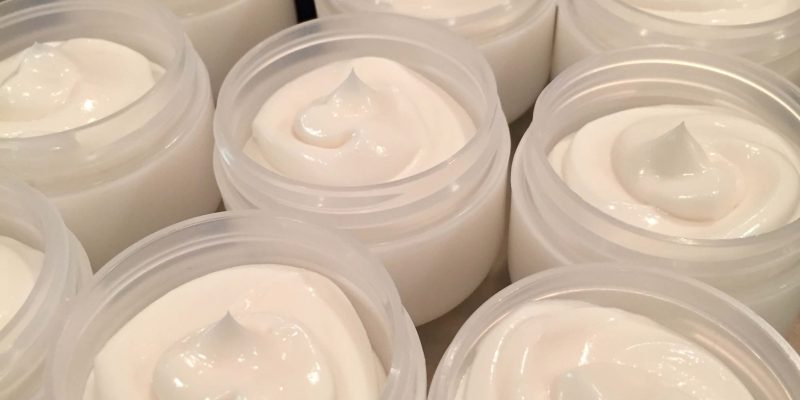
- Peintures, revêtements et produits industriels

Amélioration des propriétés rhéologiques des revêtements
HPMC optimise les propriétés d'écoulement et de nivellement des peintures, offrant une finition plus lisse et plus professionnelle.
Amélioration de la stabilité et de l'application des peintures
En améliorant la stabilité, le HPMC garantit que les peintures conservent leur intégrité au fil du temps, les rendant plus faciles à appliquer et plus durables.
Spécifications d'application recommandées dans tous les secteurs
| Modèle HPMC | Viscosité (mPa.s) | Codes équivalents | Teneur en méthoxy (%) | Teneur en hydroxypropyle (%) | valeur du pH | Humidité (%) | Teneur en cendres (%) | Applications typiques | Caractéristiques principales |
|---|---|---|---|---|---|---|---|---|---|
| HPMC 40000 | 40,000 | M35M, K4M (Dow) | 27% – 30% | 7% – 12% | 6.0 – 8.0 | ≤ 5% | ≤ 5% | Colle à carrelage, EIFS, mastic mural | Excellente rétention d'eau, améliore la maniabilité, empêche l'affaissement |
| HPMC 50000 | 50,000 | F4M, M20M | 26% – 30% | 7% – 11% | 6.2 – 7.8 | ≤ 4,5% | ≤ 4,5% | Composés autonivelants, enduits de ciment | Améliore le temps ouvert, renforce la force de liaison, anti-fissuration |
| HPMC 60000 | 60,000 | K15M, M20M | 27% – 30% | 7% – 12% | 6.0 – 8.0 | ≤ 4% | ≤ 4% | Enduits de plâtre, enduits de finition à base de ciment | Force de liaison élevée, réduit le retrait au séchage |
| HPMC 75000 | 75,000 | H75M, F4M | 28% – 31% | 7% – 12% | 6.2 – 7.9 | ≤ 3,8% | ≤ 3,5% | Adhésifs pour carrelage haute performance, systèmes d'étanchéité | Améliore la durabilité, améliore la rhéologie et la résistance au glissement |
| Modèle HPMC | Viscosité (mPa.s) | Codes équivalents | Teneur en méthoxy (%) | Teneur en hydroxypropyle (%) | valeur du pH | Humidité (%) | Teneur en cendres (%) | Applications typiques | Caractéristiques principales |
|---|---|---|---|---|---|---|---|---|---|
| HPMC 5 | 5 | E5, LV5 | 19% – 30% | 7% – 12% | 5.0 – 8.0 | ≤ 5% | ≤ 1,5% | Formulations liquides, Collyres, Pelliculages à dissolution rapide | Faible viscosité, dissolution rapide, convient aux excipients à base liquide |
| HPMC 15000 | 15,000 | K15M, Benecel K15M | 19% – 29% | 7% – 12% | 5.0 – 7.8 | ≤ 4,5% | ≤ 1,2% | Comprimés à libération prolongée | Viscosité moyenne, libération contrôlée, activateur de biodisponibilité |
| HPMC 40000 | 40,000 | M35M, K4M | 20% – 29% | 7% – 12% | 5.2 – 7.5 | ≤ 4% | ≤ 1,0% | Formulations à libération modifiée | Viscosité élevée, améliore la matrice de gel, excellente bioadhérence |
| HPMC 100000 | 100,000 | K100M, Méthocel K100M | 20% – 30% | 8% – 12% | 5.5 – 7.2 | ≤ 3,5% | ≤ 0,8% | Systèmes de matrices hydrophiles | Viscosité ultra élevée, prolonge la libération du médicament, améliore la dureté du comprimé |
| Modèle HPMC | Viscosité (mPa.s) | Codes équivalents | Teneur en méthoxy (%) | Teneur en hydroxypropyle (%) | valeur du pH | Humidité (%) | Teneur en cendres (%) | Applications typiques | Caractéristiques principales |
|---|---|---|---|---|---|---|---|---|---|
| HPMC 5000 | 5,000 | E5, Méthocel E5 | 19% – 30% | 4% – 10% | 5.0 – 8.0 | ≤ 5% | ≤ 1,5% | Boissons, émulsifiants laitiers | Faible viscosité, excellente émulsification et suspension |
| HPMC 15000 | 15,000 | K15M, Benecel K15M | 20% – 30% | 5% – 11% | 5.5 – 7.5 | ≤ 4,5% | ≤ 1,2% | Viande végétale, produits laitiers végétaliens | Viscosité moyenne, stabilise la structure des protéines, améliore la sensation en bouche |
| HPMC 40000 | 40,000 | M35M, K4M | 21% – 30% | 6% – 12% | 5.2 – 7.5 | ≤ 4% | ≤ 1,0% | Boulangerie, pâte sans gluten | Améliore l'élasticité, améliore la rétention d'eau lors de la cuisson |
| HPMC 75000 | 75,000 | H75M, F4M | 22% – 30% | 7% – 12% | 5.5 – 7.2 | ≤ 3,8% | ≤ 0,8% | Gélifiant thermostable, viandes transformées | Forme des gels thermostables, améliore la texture des produits carnés |
| Modèle HPMC | Viscosité (mPa.s) | Codes équivalents | Teneur en méthoxy (%) | Teneur en hydroxypropyle (%) | valeur du pH | Humidité (%) | Teneur en cendres (%) | Applications typiques | Caractéristiques principales |
|---|---|---|---|---|---|---|---|---|---|
| HPMC 4000 | 4,000 | E4M, Méthocel E4M | 19% – 30% | 4% – 10% | 5.0 – 8.0 | ≤ 5% | ≤ 1,5% | Lotions, crèmes | Faible viscosité, améliore l'étalement et la texture |
| HPMC 15000 | 15,000 | K15M, Benecel K15M | 20% – 30% | 5% – 11% | 5.5 – 7.5 | ≤ 4,5% | ≤ 1,2% | Masques et gels pour le visage | Viscosité moyenne, excellente filmogénicité, hydratation |
| HPMC 60000 | 60,000 | M35M, K4M | 21% – 30% | 6% – 12% | 5.2 – 7.5 | ≤ 4% | ≤ 1,0% | Soins capillaires, shampoings | Haute viscosité, améliore le conditionnement des cheveux, renforce la mousse |
| HPMC 200000 | 200,000 | H200M, F4M | 22% – 30% | 7% – 12% | 5.5 – 7.2 | ≤ 3,8% | ≤ 0,8% | Gels épaississants, mascara | Viscosité ultra élevée, stabilise les formulations, améliore l'adhérence |
| Modèle HPMC | Viscosité (mPa.s) | Codes équivalents | Teneur en méthoxy (%) | Teneur en hydroxypropyle (%) | valeur du pH | Humidité (%) | Teneur en cendres (%) | Applications typiques | Caractéristiques principales |
|---|---|---|---|---|---|---|---|---|---|
| HPMC 40000 | 40,000 | M35M, K4M | 19% – 30% | 7% – 12% | 6.0 – 8.0 | ≤ 5% | ≤ 2% | Peintures à l'eau, peintures en émulsion | Améliore la viscosité, améliore la dispersion des pigments, anti-affaissement |
| HPMC 60000 | 60,000 | F4M, M20M | 20% – 30% | 7% – 11% | 6.2 – 7.8 | ≤ 4,5% | ≤ 2% | Revêtements haute performance, peintures pour bois | Améliore les propriétés d'écoulement, améliore le nivellement et l'adhérence |
| HPMC 80000 | 80,000 | K15M, M20M | 21% – 30% | 7% – 12% | 6.0 – 8.0 | ≤ 4% | ≤ 1,5% | Peintures industrielles, revêtements de protection | Excellent épaississement, anti-affaissement, durabilité améliorée |
| HPMC 100000 | 100,000 | H75M, F4M | 22% – 30% | 7% – 12% | 6.2 – 7.9 | ≤ 3,8% | ≤ 1,5% | Revêtements texturés, peintures spéciales | Assure une formation de film supérieure, améliore la maniabilité |
| Modèle HPMC | Viscosité (mPa.s) | Codes équivalents | Teneur en méthoxy (%) | Teneur en hydroxypropyle (%) | valeur du pH | Humidité (%) | Teneur en cendres (%) | Applications typiques | Caractéristiques principales |
|---|---|---|---|---|---|---|---|---|---|
| HPMC 10000 | 10,000 | E10M, Méthocel E10M | 19% – 30% | 4% – 10% | 6.0 – 8.5 | ≤ 5% | ≤ 3% | Détergents liquides, liquides vaisselle | Faible viscosité, améliore le contrôle de la mousse, stabilise les tensioactifs |
| HPMC 30000 | 30,000 | K30M, Benecel K30M | 20% – 30% | 5% – 11% | 6.5 – 8.0 | ≤ 4,5% | ≤ 2,5% | Adoucissants, détergents à lessive | Améliore l'épaississement, prévient la sédimentation, améliore l'écoulement |
| HPMC 50000 | 50,000 | M50M, K4M | 21% – 30% | 6% – 12% | 6.2 – 8.0 | ≤ 4% | ≤ 2% | Gels nettoyants concentrés, savons pour les mains | Améliore la stabilité de la viscosité, améliore la suspension |
| HPMC 75000 | 75,000 | H75M, F4M | 22% – 30% | 7% – 12% | 6.5 – 8.5 | ≤ 3,8% | ≤ 1,5% | Nettoyants puissants, détergents industriels | Assure une stabilité de la viscosité à long terme et améliore l'adhérence |
Comment est fabriquée l'hydroxypropylméthylcellulose (HPMC)
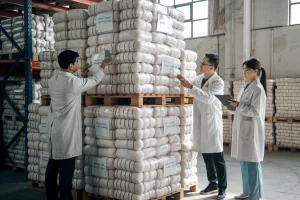
Sélection de la cellulose
La cellulose brute de haute qualité est soigneusement sélectionnée.
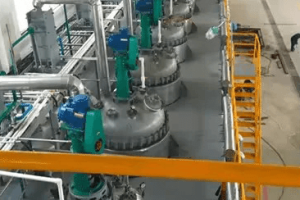
Traitement alcalin
La cellulose est traitée avec un alcali pour activer sa surface.
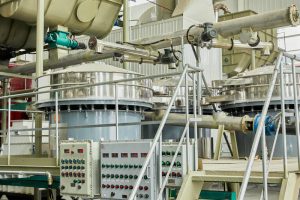
Ethérification
Les groupes méthoxyle et hydroxypropyle sont introduits par des réactions chimiques.
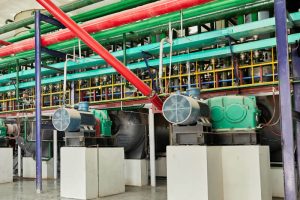
Neutralisation
L'excès d'alcali est neutralisé pour stabiliser le produit.
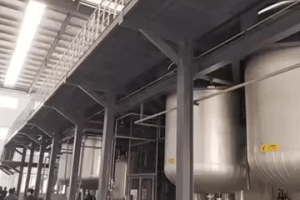
Purification
Les impuretés sont éliminées pour garantir une pureté et une cohérence élevées.

Séchage
Le matériau est séché pour atteindre la teneur en humidité souhaitée.
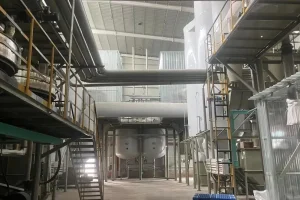
Fraisage
Le produit séché est broyé jusqu’à obtenir une granulométrie fine et uniforme.
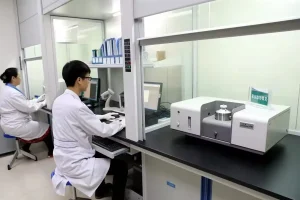
Contrôle de qualité
Les contrôles de qualité finaux garantissent la conformité aux spécifications du client.
Pourquoi s'associer à Morton New Material pour vos besoins en hydroxypropylméthylcellulose (HPMC) ?
Chez Morton, nous combinons expertise, technologie de pointe et approche centrée sur le client pour fournir des solutions d'hydroxypropylméthylcellulose (HPMC) adaptées à vos besoins. Notre engagement envers la qualité et le service garantit que vous recevez des produits cohérents et fiables pour dynamiser votre entreprise.
- Une qualité constante à laquelle vous pouvez faire confiance :Nous garantissons une qualité stable d'un lot à l'autre grâce à des tests rigoureux et à des techniques de fabrication avancées, garantissant que vos processus de production restent ininterrompus.
- Normes et conformité mondiales :
Nos produits HPMC répondent aux normes mondiales les plus élevées, notamment les certifications UE, FDA et ISO, vous donnant confiance dans chaque expédition. - Personnalisation pour répondre à vos besoins :
Des ajustements de viscosité aux niveaux de substitution personnalisés, nous fournissons des produits HPMC personnalisés pour améliorer vos applications et formulations spécifiques. - Logistique et assistance fiables :
Avec un solide réseau d’exportation et une équipe de service client dédiée, nous garantissons des livraisons rapides et une assistance technique professionnelle, minimisant ainsi les perturbations de vos opérations.Logistique et assistance fiables :
Avec un solide réseau d’exportation et une équipe de service client dédiée, nous garantissons des livraisons rapides et une assistance technique professionnelle, minimisant ainsi les perturbations de vos opérations.
Choisir Morton, c'est s'associer à un fournisseur de confiance qui comprend les défis de votre secteur et propose des solutions qui améliorent l'efficacité, la conformité et la durabilité. Laissez Morton favoriser la réussite de votre entreprise avec des produits HPMC fiables et de haute qualité.
Comment choisir le meilleur fabricant d’hydroxypropylméthylcellulose pour votre entreprise ?
Choisir le bon fabricant d'hydroxypropylméthylcellulose (HPMC) est une décision cruciale qui a un impact direct sur le succès de votre entreprise. Une HPMC de haute qualité et constante est essentielle pour des performances supérieures dans les adhésifs pour carrelage, les revêtements pharmaceutiques et les matériaux de construction respectueux de l'environnement.
Dans un marché mondial concurrentiel, identifier des fabricants innovants qui appliquent un contrôle qualité rigoureux peut préserver votre réputation, améliorer vos marges et renforcer la confiance des clients. Ce guide met en évidence des facteurs clés tels que les technologies avancées d'éther de cellulose et les pratiques de contrôle qualité, vous permettant de distinguer les partenaires fiables des options de qualité inférieure.
Que vous soyez un professionnel chevronné ou un nouveau venu dans le domaine du HPMC, la compréhension de ces priorités vous garantit de faire un choix éclairé qui favorise l'évolutivité, l'innovation et le succès à long terme de votre entreprise.
Table des matières
Comprendre l'hydroxypropylméthylcellulose
Qu'est-ce que l'hydroxypropylméthylcellulose ?
L'hydroxypropylméthylcellulose (HPMC) est un ingrédient essentiel dans une large gamme d'applications industrielles et grand public. Qu'est-ce qui le rend si polyvalent ? Dérivé de la cellulose par un processus chimique précis qui introduit des groupes méthyle et hydroxypropyle, l'HPMC est un polymère hautement adaptable. Connu pour sa solubilité dans l'eau et ses propriétés épaississantes, il joue un rôle clé dans des secteurs tels que la construction, les produits pharmaceutiques et la production alimentaire. Examinons de plus près ses attributs uniques.
Principales propriétés et applications du HPMC
Les propriétés distinctives du HPMC en font la pierre angulaire de diverses applications. Pourquoi est-ce si important ? Sa capacité exceptionnelle de rétention d'eau améliore les performances du ciment et du plâtre, améliorant ainsi la maniabilité et empêchant un séchage prématuré. Dans les environnements à haute température, ses propriétés de gélification thermique assurent la stabilité et la fonctionnalité. En tant qu'épaississant et agent filmogène, le HPMC contribue à la durabilité et à la consistance des adhésifs pour carrelage, des peintures et des revêtements. Pour les industries pharmaceutiques et alimentaires, les grades HPMC de haute pureté agissent comme liants, émulsifiants et agents à libération contrôlée, répondant à des exigences strictes de sécurité et de réglementation.
La compréhension et l'exploitation des capacités multidimensionnelles de l'HPMC sont essentielles pour l'innovation et l'efficacité dans le développement de produits. Son adaptabilité n'est pas seulement un atout mais un avantage stratégique, offrant des solutions qui répondent aux exigences évolutives des marchés concurrentiels.
Comment pouvez-vous maximiser son potentiel ? La réponse consiste à exploiter ses propriétés pour améliorer les performances et la fiabilité de vos applications.
L'importance de la qualité dans la fabrication HPMC
Normes de qualité et certifications HPMC à rechercher
Dans les industries qui dépendent de l'hydroxypropylméthylcellulose (HPMC), la qualité est une exigence essentielle. Comment pouvez-vous vous assurer qu'un fabricant respecte ces normes ? Les fabricants réputés respectent des certifications reconnues mondialement, telles que la norme ISO 9001 pour la gestion de la qualité, la norme ISO 14001 pour la conformité environnementale et les BPF (bonnes pratiques de fabrication) de qualité pharmaceutique. Ces certifications garantissent que l'HPMC que vous achetez respecte des critères stricts de sécurité, de cohérence et de pureté, permettant des performances irréprochables dans une large gamme d'applications.
Comment les degrés de viscosité affectent les performances du produit
Les grades de viscosité sont bien plus que des données techniques : ils sont essentiels à la fonctionnalité de l'HPMC dans différentes applications. Pourquoi est-ce important ? Qu'il soit utilisé pour créer des mortiers de ciment exploitables ou pour stabiliser des formulations pharmaceutiques, le choix du grade de viscosité approprié a un impact direct sur la texture, la consistance et les performances. Les erreurs de sélection de grade peuvent entraîner des inefficacités coûteuses ou des défaillances de produits. Il est essentiel de s'associer à un fabricant proposant une gamme diversifiée et précise d'options de viscosité pour garantir des résultats optimaux.
Le rôle de la rétention d'eau et des propriétés de gélification thermique
La capacité du HPMC à retenir l'eau et à présenter une gélification thermique dans des conditions spécifiques en fait un matériau à part entière améliorant les performances. Pourquoi ces propriétés sont-elles si importantes ? Elles améliorent la maniabilité des matériaux de construction, renforcent l'adhérence dans les revêtements et permettent une libération contrôlée dans les applications pharmaceutiques. La cohérence de ces propriétés est essentielle pour garantir la fiabilité de vos produits finis. Collaborer avec un fabricant engagé à respecter ces normes garantit que vos matériaux répondent aux exigences du marché et les dépassent.
La fabrication de HPMC de haute qualité est l'épine dorsale de l'innovation et de l'avantage concurrentiel. En privilégiant la qualité, en comprenant l'importance des grades de viscosité et en garantissant la cohérence des propriétés critiques telles que la rétention d'eau et la gélification thermique, vous ne vous contentez pas de vous approvisionner en matériaux : vous positionnez votre entreprise pour un succès durable.
Évaluer les capacités d'un fabricant
Aperçu du processus de production HPMC
La production d'hydroxypropylméthylcellulose (HPMC) est un processus complexe et méticuleux qui combine la cellulose avec des groupes hydroxypropyle et méthyle pour produire un polymère doté d'une fonctionnalité exceptionnelle. Pourquoi est-ce important ? Un fabricant fiable exerce un contrôle strict sur chaque phase, de l'approvisionnement en matières premières de haute qualité à l'exécution de contrôles de qualité rigoureux à chaque étape. Cela garantit que le produit répond à des normes élevées de performance, de cohérence et de sécurité. L'évaluation du processus d'un fabricant peut révéler son engagement envers l'innovation, la responsabilité environnementale et la précision.
Personnalisation des diplômes de substitution : pourquoi c'est essentiel
Pour obtenir les performances souhaitées dans les applications HPMC, il faut une personnalisation précise du degré de substitution. Pourquoi cela est-il si important ? Le rapport entre les groupes méthyle et hydroxypropyle influence considérablement les propriétés critiques telles que la viscosité, la solubilité et la stabilité thermique. Les fabricants ayant une expertise dans la personnalisation des degrés de substitution vous permettent de développer des formulations qui s'adaptent parfaitement aux exigences spécifiques des applications. Ce niveau de personnalisation garantit une fonctionnalité optimale et distingue vos produits sur les marchés concurrentiels.
Technologie avancée d'éther de cellulose : garder une longueur d'avance
Pour rester compétitifs dans un secteur dynamique, les fabricants doivent exploiter les technologies avancées d'éther de cellulose. Quels sont vos avantages ? Des innovations telles que l'optimisation de la distribution granulométrique, la réduction de la teneur en métaux lourds et l'amélioration des propriétés de gélification thermique améliorent la qualité du produit et élargissent ses applications. Un fabricant qui investit dans des technologies de pointe témoigne de son engagement à rester en avance sur les tendances du secteur et à proposer des solutions qui répondent aux demandes évolutives du marché.
L'évaluation des capacités d'un fabricant est bien plus qu'une simple étape de vérification préalable : c'est une décision stratégique qui a un impact sur votre réussite. En vous associant à un fournisseur qui privilégie la précision, l'innovation et la personnalisation, vous positionnez votre entreprise pour exceller en termes de qualité et de performance.
Vous souhaitez identifier le partenaire de fabrication idéal ? Commencez par analyser ses processus et son engagement envers les technologies de pointe.
Applications spécifiques à l'industrie
HPMC de qualité pharmaceutique pour excipients et revêtements
Dans le secteur pharmaceutique, l'hydroxypropylméthylcellulose (HPMC) est indispensable en raison de sa précision et de sa pureté. Pourquoi est-elle si importante ? En tant que liant, agent filmogène et excipient à libération contrôlée, l'HPMC de qualité pharmaceutique garantit des performances constantes tout en répondant à des normes réglementaires strictes. Sa solubilité et sa biocompatibilité en font une pierre angulaire du développement de médicaments sûrs et efficaces. Cette fiabilité est essentielle pour les formulations de médicaments avancées et les technologies de libération prolongée.
Additifs de construction : solutions adhésives pour ciment, plâtre et carrelage
Le HPMC est un additif essentiel dans les matériaux de construction, améliorant la durabilité et la maniabilité. Pourquoi est-ce important ? Il améliore la rétention d'eau, prévient le séchage prématuré et renforce l'adhérence et la consistance des formulations de colles à base de ciment, de plâtre et de carrelage. En optimisant la douceur et la résistance des mortiers et des finitions, le HPMC de qualité construction offre efficacité et fiabilité sur site, contribuant ainsi à créer des structures durables et à réduire les besoins de maintenance.
HPMC de qualité alimentaire : garantir la pureté des produits comestibles
Dans la production alimentaire, le HPMC contribue à la sécurité et à l'innovation. Comment y parvient-il ? Servant d'épaississant, d'émulsifiant et de stabilisant, le HPMC de qualité alimentaire répond à des normes de pureté élevées et est idéal pour les tendances alimentaires modernes. Il est largement utilisé dans la pâtisserie sans gluten, les formulations hypocaloriques et d'autres produits soucieux de la santé, offrant structure et consistance tout en préservant la sécurité et l'attrait des applications comestibles.
Stabilisateurs cosmétiques et applications de soins personnels
Dans les produits cosmétiques et de soins personnels, le HPMC se distingue par sa capacité à stabiliser et à améliorer les formulations. Pourquoi est-il essentiel ? En tant qu'épaississant et stabilisant, il garantit des textures lisses, des émulsions fiables et une durée de conservation plus longue. Des crèmes et lotions luxueuses aux shampooings et gels coiffants, le HPMC aide les fabricants à proposer des produits qui répondent aux attentes élevées des consommateurs en matière de qualité, de performance et d'attrait sensoriel.
Une solution polyvalente pour tous les secteurs d'activité
L'adaptabilité de l'HPMC à travers les industries souligne sa valeur en tant qu'ingrédient multifonctionnel. Que ce soit dans les domaines pharmaceutique, de la construction, de l'alimentation ou des cosmétiques, la sélection de la bonne qualité d'HPMC améliore les performances du produit et garantit la conformité aux normes spécifiques du marché.
Prêt à exploiter le potentiel de l'HPMC dans vos applications ? Identifiez la nuance qui correspond aux exigences spécifiques de votre secteur et commencez dès aujourd'hui à stimuler l'innovation et la qualité.
Facteurs clés à prendre en compte chez un fabricant
Réputation en tant que fournisseur fiable de HPMC
La réputation d'un fabricant est une mesure essentielle de sa fiabilité et de sa qualité. Comment l'évaluer ? Recherchez des antécédents avérés en matière de fourniture d'hydroxypropylméthylcellulose (HPMC) de haute qualité dans divers secteurs. Les avis des clients, les études de cas et les témoignages sont inestimables pour évaluer leur engagement envers l'excellence. La régularité avec laquelle ils répondent aux attentes des clients et favorisent des partenariats à long terme en dit long sur leur crédibilité.
Disponibilité de l'approvisionnement en HPMC en vrac et options d'expédition internationale
Dans une économie mondialisée, la capacité d'un fabricant à gérer des commandes en gros et à assurer une expédition internationale efficace est essentielle. Pourquoi est-ce important ? Une logistique fiable et une capacité de production évolutive garantissent un approvisionnement ininterrompu pour répondre aux demandes du marché. Les fabricants dotés de systèmes de chaîne d'approvisionnement bien organisés vous aident à éviter les retards et les perturbations, ce qui permet à votre entreprise de fonctionner de manière transparente et de conserver son avantage concurrentiel.
Services de soutien technique et capacités de R&D
Les meilleurs fabricants ne se contentent pas de fournir des produits, ils proposent également un support technique et des services de R&D solides. Pourquoi est-ce important ? Une équipe de R&D solide peut vous aider à relever les défis de formulation, à développer des solutions personnalisées et à optimiser les performances des produits pour répondre à vos exigences spécifiques. L'accès à des conseils techniques d'experts accélère non seulement l'innovation, mais réduit également les processus coûteux d'essais et d'erreurs.
Responsabilité environnementale : fabrication respectueuse de l'environnement et pratiques durables
La durabilité n'est plus une option : c'est une attente fondamentale pour les entreprises modernes. Comment pouvez-vous vous assurer que votre fabricant s'aligne sur vos objectifs de durabilité ? Recherchez des pratiques telles que la réduction des émissions de carbone, la minimisation des déchets et l'utilisation de matières premières respectueuses de l'environnement. Un engagement en faveur d'une production durable non seulement soutient les objectifs environnementaux, mais renforce également l'attrait de votre marque auprès des consommateurs soucieux de l'environnement.
Choisir le bon partenaire pour un succès à long terme
En évaluant ces facteurs, vous pouvez identifier un fabricant d'hydroxypropylméthylcellulose qui correspond à vos objectifs commerciaux. Un fournisseur doté d'une solide réputation, d'une logistique évolutive, d'un soutien innovant et de pratiques durables répondra non seulement à vos besoins, mais contribuera également activement à votre croissance et à votre leadership sur le marché.
Prêt à faire un choix stratégique ? Commencez par évaluer comment ces facteurs correspondent aux besoins de votre entreprise et passez à l’étape suivante vers un partenariat réussi.
Comparaison des coûts et de la valeur
Hydroxypropylméthylcellulose : prix et qualité : trouver le juste équilibre
Si le prix est un facteur clé lors de la sélection d'un fournisseur d'hydroxypropylméthylcellulose (HPMC), la qualité est la pierre angulaire de la véritable valeur. Pourquoi est-ce si important ? Le choix d'options à faible coût peut réduire les dépenses au départ, mais une qualité inégale peut entraîner des retards de production, un gaspillage plus important et l'insatisfaction des clients. Donner la priorité aux fournisseurs qui offrent un équilibre entre prix compétitifs et qualité fiable garantit non seulement la rentabilité, mais aussi la fiabilité opérationnelle et le succès à long terme.
Évaluation du coût total de possession : au-delà du prix
Le coût réel de l'HPMC va bien au-delà du prix d'achat. Que faut-il prendre en compte ? La fiabilité de l'expédition, la stabilité du produit et la cohérence d'un lot à l'autre jouent toutes un rôle essentiel dans la détermination du coût total de possession. Payer un peu plus pour un fournisseur fiable permet souvent de réaliser des économies grâce à la diminution du nombre de lots rejetés, à la réduction des déchets et à la rationalisation des processus. Cette approche minimise les risques et améliore l'efficacité opérationnelle, offrant ainsi une plus grande valeur ajoutée au fil du temps.
Trouver le juste équilibre
Trouver l’équilibre idéal entre coût et qualité nécessite une approche globale. Évaluez les fournisseurs non seulement en fonction des prix, mais aussi de leur capacité à fournir des produits cohérents et de haute qualité, une logistique efficace et un support technique solide. Cet investissement stratégique maximise votre retour sur investissement et renforce vos opérations commerciales.
Prêt à aligner les coûts sur la valeur ? Choisissez un fabricant HPMC qui privilégie la qualité sans compromettre l'accessibilité pour garantir un succès durable.
Évaluation de la qualité et de la cohérence de la production
Distribution granulométrique : garantir l'uniformité du produit
Une granulométrie uniforme est essentielle pour des performances constantes dans les applications d'hydroxypropylméthylcellulose (HPMC). Pourquoi est-ce important ? Une distribution précise de la granulométrie garantit un mélange optimal, une dissolution efficace et une fonctionnalité prévisible dans des produits tels que les adhésifs de construction et les formulations pharmaceutiques. Les fabricants qui utilisent des technologies de criblage avancées et des processus de contrôle rigoureux fournissent l'uniformité nécessaire pour maintenir l'intégrité de vos produits finis.
HPMC de haute pureté pour applications exigeantes
Dans des secteurs comme les produits pharmaceutiques, l'alimentation et les cosmétiques, la pureté n'est pas négociable. Pourquoi est-ce essentiel ? L'HPMC de haute pureté minimise la présence de contaminants, garantissant ainsi la sécurité et la fiabilité dans les applications sensibles. Les fabricants dotés de systèmes de purification de pointe produisent des matériaux conformes à des normes réglementaires rigoureuses, préservant ainsi à la fois la qualité du produit et la réputation de la marque. Choisir un fournisseur qui accorde la priorité à la pureté est un investissement dans le succès de votre entreprise et la confiance des clients.
Comment identifier une qualité fiable d'un lot à l'autre
La cohérence entre les lots de production est la marque de fabrique d'un fabricant HPMC fiable. Comment pouvez-vous l'évaluer ? La variabilité de la qualité peut entraîner des inefficacités opérationnelles, des retouches coûteuses ou des défaillances de produits. Recherchez des fabricants dotés de systèmes de contrôle qualité robustes, de protocoles de test fréquents et de certifications complètes. La transparence de leurs processus et un historique de fiabilité éprouvé garantissent que chaque lot répondra à vos normes rigoureuses.
Renforcer la confiance dans votre chaîne d'approvisionnement
L'évaluation de la qualité et de la cohérence de la production d'un fabricant ne se limite pas à la conformité : il s'agit de garantir que votre entreprise peut fonctionner efficacement et fournir des produits qui répondent aux attentes des clients. Un fournisseur HPMC de confiance fournit la cohérence, la pureté et la fiabilité nécessaires pour soutenir votre croissance et maintenir votre avantage concurrentiel.
Prêt à améliorer votre chaîne d’approvisionnement ? Commencez par donner la priorité aux fabricants qui ont fait leurs preuves et qui s’engagent sans faille en matière de qualité.
Conformité réglementaire et normes mondiales
Respect de la réglementation européenne en matière d'importation de produits chimiques
L'Union européenne impose certaines des réglementations les plus strictes au monde sur les importations de produits chimiques, notamment l'hydroxypropylméthylcellulose (HPMC). Pourquoi est-ce un élément essentiel à prendre en compte ? La conformité à REACH (Registration, Evaluation, Authorization, and Restriction of Chemicals) et aux autres directives de l'UE garantit que vos produits répondent aux normes de sécurité et environnementales. Les fabricants expérimentés dans la navigation dans ces réglementations peuvent simplifier le processus d'approbation, gagner du temps et éviter des perturbations ou des pénalités coûteuses. La sélection d'un fournisseur ayant fait ses preuves en matière de conformité à l'UE est essentielle pour une entrée en douceur sur le marché.
Certifications à rechercher chez un fabricant d'éther de cellulose
Les certifications sont un indicateur clair de la conformité d'un fabricant aux normes de qualité et réglementaires. Lesquelles sont les plus importantes ? Les certifications ISO telles que ISO 9001 (gestion de la qualité) et ISO 14001 (gestion de l'environnement) démontrent un engagement envers la cohérence et la durabilité. Pour les produits HPMC de qualité pharmaceutique ou alimentaire, recherchez les approbations de la FDA et la certification GMP (bonnes pratiques de fabrication). Ces références garantissent que le fournisseur répond aux exigences strictes des marchés mondiaux, vous offrant ainsi l'assurance de produits sûrs et fiables.
Rester compétitif grâce à la conformité
Le respect des exigences réglementaires et le maintien des certifications mondiales ne sont plus une option sur les marchés interconnectés d'aujourd'hui : c'est une nécessité concurrentielle. Les fabricants qui accordent la priorité à la conformité vous aident à atténuer les risques, à maintenir l'accès au marché et à préserver la réputation de votre marque.
Prêt à optimiser la conformité et l'intégration mondiale ? Associez-vous à un fournisseur HPMC qui démontre son expertise dans la navigation dans des environnements réglementaires complexes et adhère aux normes internationales les plus strictes.
Établir un partenariat solide
Pourquoi la communication et l’expertise technique sont importantes
Un partenariat réussi avec un fabricant d’hydroxypropylméthylcellulose (HPMC) va au-delà de la livraison du produit : il repose sur une communication claire et une expertise technique. Pourquoi est-ce si important ? Les fabricants réactifs qui apportent des connaissances techniques approfondies peuvent vous aider à résoudre les problèmes, proposer des solutions personnalisées et suggérer des innovations adaptées à vos besoins. Cette collaboration permet à votre entreprise de rester agile, compétitive et mieux équipée pour s’adapter aux demandes changeantes du marché.
Questions à poser à un fournisseur potentiel d'hydroxypropylméthylcellulose
Poser les bonnes questions est essentiel pour comprendre les capacités d'un fournisseur et leur adéquation avec vos objectifs. Sur quoi devez-vous vous concentrer ?
- Assurance qualité: Quels systèmes ont-ils mis en place pour garantir la cohérence d’un lot à l’autre ?
- Capacités de personnalisation : Peuvent-ils modifier les propriétés de l’HPMC pour répondre aux exigences spécifiques des applications ?
- Services de soutien : Fournissent-ils des conseils techniques et aident-ils à résoudre les problèmes de formulation ?
- Communication: Dans quelle mesure sont-ils transparents et réactifs dans leur réponse aux préoccupations des clients ?
Ces demandes vous aideront à évaluer si le fabricant peut répondre à vos besoins immédiats et soutenir votre croissance à long terme.
Études de cas et histoires de réussite
Exemples d'entreprises prospères avec le bon partenaire HPMC
Derrière chaque produit révolutionnaire se cache un partenaire de fabrication fiable. Prenons l’exemple d’une entreprise de construction de taille moyenne qui a révolutionné sa gamme de produits en collaborant avec un fournisseur HPMC offrant des propriétés exceptionnelles de rétention d’eau et de gélification thermique. Les solutions sur mesure ont amélioré les performances du mortier, réduit les coûts de production et augmenté la part de marché. Ce type de transformation met en évidence l’impact du choix d’un fabricant qui comprend et anticipe vos besoins.
Leçons apprises auprès des leaders du secteur
Qu'est-ce qui distingue les leaders du secteur ? Leur réussite repose souvent sur des partenariats avec des fournisseurs qui s'alignent sur leurs objectifs, offrent une qualité constante et soutiennent le respect des réglementations. Ces entreprises soulignent l'importance de l'innovation, du support technique et d'une communication claire. Leurs histoires soulignent qu'une relation stratégique avec un fournisseur n'est pas seulement un avantage, mais une nécessité pour un succès durable.
Transformer les idées en actions
Établir une relation solide avec votre fournisseur HPMC est un investissement stratégique pour l'avenir de votre entreprise. En privilégiant une communication ouverte, la fiabilité technique et une vision commune de la croissance, vous pouvez établir un partenariat qui favorise l'innovation, l'efficacité et la résilience.
Prêt à créer votre success story ? Commencez par collaborer avec un fournisseur qui comprend vos défis et qui s'engage à contribuer à votre réussite.
Innovations dans la fabrication HPMC
Tendances qui façonnent le marché mondial de l'HPMC
Le marché de l'hydroxypropylméthylcellulose (HPMC) connaît une évolution rapide, portée par les avancées technologiques et l'évolution des attentes des consommateurs. Qu'est-ce qui alimente ces développements ? Les principales tendances incluent une plus grande importance accordée à la personnalisation pour répondre aux besoins spécifiques des applications, une fabrication de précision pour une meilleure cohérence et l'intégration d'additifs intelligents pour améliorer la fonctionnalité. Les fabricants qui adoptent ces innovations redéfinissent les normes de l'industrie, permettant aux entreprises de rester compétitives sur des marchés dynamiques.
Le rôle des polymères biodégradables et des solutions durables
La durabilité est devenue un enjeu crucial dans la fabrication de HPMC. Pourquoi est-ce important ? L’évolution vers des polymères biodégradables et des méthodes de production respectueuses de l’environnement contribue à répondre à la demande mondiale croissante de pratiques respectueuses de l’environnement. Les principaux fabricants intègrent des matières premières durables, optimisent la consommation d’énergie et minimisent les déchets pendant la production, tout en maintenant une qualité de produit élevée. Cette approche non seulement soutient les objectifs environnementaux, mais trouve également un écho auprès des consommateurs et des entreprises à la recherche de solutions plus écologiques.
Tirer parti de l’innovation pour la réussite des entreprises
Les tendances innovantes dans la fabrication de HPMC établissent de nouvelles références en matière de performances, de fiabilité et de durabilité. Qu'est-ce que cela signifie pour votre entreprise ? En collaborant avec des fabricants avant-gardistes, vous pouvez bénéficier de technologies de pointe, de solutions personnalisées et de pratiques respectueuses de l'environnement. En vous alignant sur ces avancées, votre entreprise peut être à la pointe de l'innovation et avoir un impact sur le marché.
Prêt à adopter l'avenir de la fabrication HPMC ? Commencez par collaborer avec un fournisseur qui privilégie l'innovation et la durabilité.
Conclusion
En résumé : les points clés à retenir pour choisir le meilleur fabricant HPMC
Choisir le bon fabricant d'hydroxypropylméthylcellulose (HPMC) n'est pas seulement une tâche d'approvisionnement : c'est une décision stratégique qui a des répercussions considérables sur la qualité de vos produits, la satisfaction de vos clients et la croissance de votre entreprise. Pourquoi est-ce essentiel ? Le fabricant idéal offre une qualité constante, une expertise technique et des capacités de personnalisation tout en adhérant aux normes réglementaires et en adoptant des pratiques durables. Ces attributs garantissent que votre entreprise reste compétitive et adaptable sur des marchés en évolution.
Liste de contrôle finale pour prendre votre décision
Avant de finaliser votre choix de fabricant HPMC, tenez compte des éléments suivants :
- Certifications et normes : Le fabricant est-il conforme aux certifications mondiales telles que ISO, FDA et GMP ?
- Capacités de personnalisation : Peuvent-ils adapter les propriétés HPMC pour répondre aux exigences spécifiques de votre application ?
- Fiabilité de la chaîne d’approvisionnement : Disposent-ils d’une logistique solide et d’un historique éprouvé de livraison dans les délais ?
- Innovation et durabilité : Sont-ils engagés à faire progresser la technologie et à adopter des pratiques respectueuses de l’environnement ?
- Support technique et communication : Fournissent-ils une communication claire et une assistance technique pour relever les défis ?
Faire un choix stratégique
En prenant en compte ces facteurs critiques, vous garantissez que votre fournisseur HPMC est plus qu'un simple fournisseur : il devient un partenaire précieux qui investit dans votre réussite. Le bon fabricant permet à votre entreprise d'innover, d'exceller en qualité et de réaliser une croissance durable sur des marchés concurrentiels.
Prêt à aller de l’avant ? Utilisez cette liste de contrôle comme feuille de route et choisissez un fabricant qui correspond à votre vision du succès.
Appel à l'action
Encourager les entreprises à évaluer leur fournisseur actuel
Votre fournisseur actuel d'hydroxypropylméthylcellulose (HPMC) offre-t-il la qualité, la fiabilité et le soutien dont votre entreprise a besoin ? Si ce n'est pas le cas, il est peut-être temps de changer. Combien l'incohérence ou le manque d'innovation coûtent-ils à vos opérations ? Dans un marché où l'excellence définit le succès, rester fidèle à un fournisseur de qualité inférieure pourrait entraver votre croissance et votre compétitivité. C'est le moment idéal pour évaluer les performances de votre fournisseur et explorer de meilleures alternatives qui correspondent à vos objectifs stratégiques. Pourquoi se contenter de moins quand vous pouvez faire plus ?
Vous souhaitez savoir comment évaluer efficacement votre fournisseur actuel ? Laissez-nous vous guider.
Offrir un guide ou une consultation gratuite aux lecteurs intéressés
Faites le premier pas vers l’amélioration avec notre guide gratuit « Choisir le bon fabricant HPMC », rempli de conseils pratiques et d’une liste de contrôle complète pour simplifier votre processus de prise de décision. Vous préférez un accompagnement personnalisé ? Réservez une consultation avec nos experts pour identifier les opportunités et découvrir un fournisseur qui peut vraiment faire progresser votre entreprise. Le bon partenaire améliorera vos opérations et vous aidera à atteindre un succès durable.
N’attendez plus : votre prochaine avancée commence ici.
En agissant dès aujourd’hui, vous pouvez transformer votre chaîne d’approvisionnement, améliorer la qualité de vos produits et positionner votre entreprise pour une croissance future. Le chemin vers l’excellence est clair et les outils sont à votre portée.
Êtes-vous prêt à prendre le contrôle et à conduire votre réussite ? Cliquez ici pour commencer.
Demander un devis gratuit
Nous aimerions travailler avec vous
Pour toute question ou demande de devis, envoyez-nous un message. Nos experts vous répondront sous 24 heures et vous aideront à choisir l'hydroxypropylméthylcellulose (HPMC) qui vous convient.
- +86-180-0311-2232
- info@aidematerial.com

